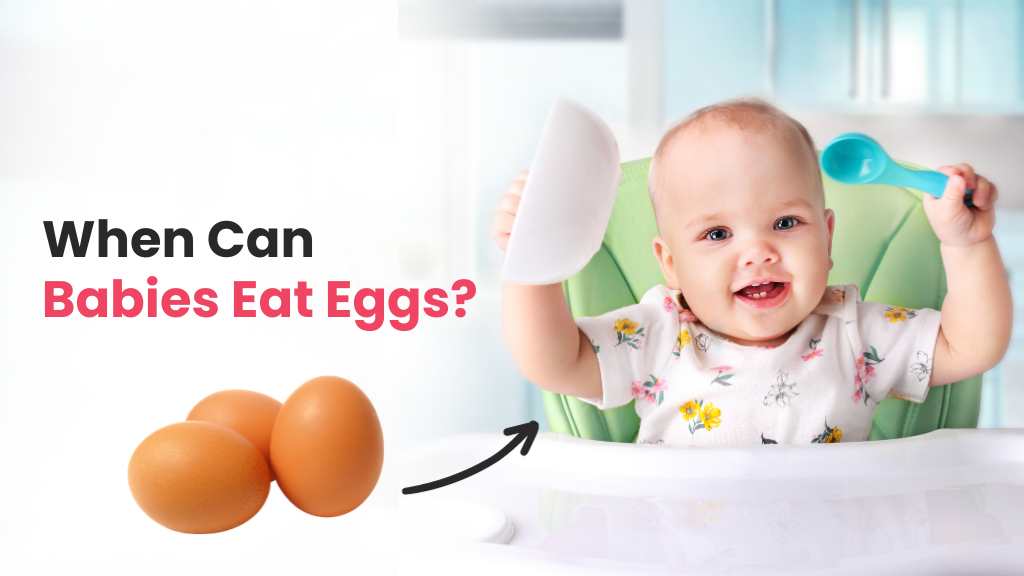
Table of Contents
If you’re in the process of introducing solid foods to your baby, you might be wondering about what foods are safe and healthy for them. You’ve got fruits, vegetables, and meats on your checklist, but what about eggs? When can babies eat eggs? This question often pops up, probably because we’re more cautious about food allergies in children nowadays.
Well, keep reading to learn when it’s safe to introduce eggs to your baby, why eggs are super healthy for little ones, and the best ways to prepare and serve eggs to ensure they’re safe for your baby to enjoy.
Check out: Baby’s First Food: When Can Babies Start Eating Baby Food
Let’s Read Some Eggilicious Facts!
Eggs aren’t just food, they’re kind of like a symbol of new beginnings in different cultures. People use them on holidays like Easter and the Iranian New Year. While we mostly talk about chicken eggs here, lots of other animals’ eggs are eaten too, like duck or goose eggs.
Eggs are super healthy, especially for babies when they’re just starting to eat real food.
Here’s a fun fact: chickens lay eggs even if they haven’t met a rooster, so not all eggs can turn into baby chicks. Modern chickens have been bred to lay a lot of eggs all year long. But for a long time, eggs were more of a seasonal treat. They were most plentiful when there was more daylight. People used different tricks to keep eggs fresh for the winter, like salting, pickling, and fermenting.
Oh, and sometimes you see eggs and milk together in the same “diary” section in your grocery store, but they’re not the same. If you’re avoiding dairy, you can still enjoy eggs!
So When Can babies Eat Eggs?
You can start giving your baby eggs at around 6 months old, which is when they usually start eating solid foods. But here’s the thing: Eggs can sometimes cause allergies in babies. So, be cautious and begin with very small amounts of well-cooked egg, both the white and the yolk. Some babies can have really bad reactions to even tiny bits of egg, so it’s important to start slowly. When you finally figure out when can babies eat eggs, don’t forget to keep an eye on how your baby reacts.
Also read: Does My Baby Have Food Allergy Rash on the Baby Belly?
Here’s a Caution!
When you’re making eggs for your baby, make sure you cook them all the way through. Eggs can sometimes have Salmonella, which can make your baby sick. To kill it off, cook the eggs until they reach 160°F (71°C). It might take a bit longer than you’re used to, but it’s worth it to keep your baby safe. Also, never use eggs that are cracked or dirty because that can make the risk of your baby getting sick even higher.
Also read: Top 10 Best Baby Food Recipes For Your Little Munchkin!
6 Reasons Why You Should Give Your Baby Eggs
Eating eggs, both the yolk and the whites, is super good for babies. Just one big egg, which weighs about 50 grams, has a bunch of good stuff:
- It’s packed with high-quality protein with a complete amino acid profile.
- There are about 70 calories in it.
- It’s loaded with B vitamins, vitamin D, minerals like selenium, iodine, iron, and zinc, and other healthy compounds.
- You get a decent 147 milligrams of choline.
- Plus, you get 30 milligrams of docosahexaenoic acid, or DHA for short.
- Eggs have all the essential fats, including cholesterol and saturated fats.
Choline is like a secret ingredient that helps a lot of important things happen in your body. For babies, it helps in brain development and function. DHA is another brain booster, helping with your growth and brain development. So, eating eggs is like giving your brain a little power-up!
Also, when chickens are raised outdoors, the eggs they lay can have more vitamin D, extra vitamin E, and omega-3 fatty acids compared to eggs from chickens raised inside big factory coops. So, if you’re looking for eggs with extra nutritional goodness, consider those from free-range chickens! 🐔🥚
How Can I Buy The Best Eggs for My Baby?
Buying eggs and reading food labels can be a bit overwhelming. Unfortunately, there’s no perfect label that tells you which eggs are the most ethical, environmentally friendly, and nutritious all at once. Terms like “cage-free,” “free range,” and “no antibiotics or hormones added” might sound good, but they don’t always mean what you’d expect, and they don’t guarantee healthier or more ethically produced eggs.
The term “pasture-raised” isn’t officially recognized by the USDA, so it gets used in different ways, but it often suggests that the chickens had a diet that included grass and insects, which can make their eggs healthier. Some certifications, like “Animal Welfare Approved” or “Certified Humane,” aim to show that chickens were treated well.
Even though pasture-raised eggs are usually more expensive than regular ones, they’re still often a cheaper source of protein compared to meat. Sometimes, local pasture-raised eggs can be cheaper than those from big companies, and buying in bulk and freezing extra eggs can save you money. If you’re on a budget while deciding when can babies eat eggs, you can also go for omega-3 enriched eggs, which means the chickens ate a diet high in omega-3s, making the eggs healthier in that regard too.
When Can Babies Have Hardboiled Eggs?
If your baby is 9 months or older and can handle small bites of food, you can give them quartered or sliced hardboiled eggs. However, it’s easier for babies to eat eggs when they’re scrambled or made into an omelet because the yolk and white are mixed. If you want to give hardboiled eggs to a younger baby, you can mash them up with a bit of water, breast milk, formula, or yogurt to make it easier for them to eat.
Warning: They can be a choking risk for little ones because the yolk can be dry and hard to move around in their mouths.
When Can Babies Have Runny Eggs?
There isn’t a specific age when it’s guaranteed safe for children to eat runny or raw eggs. Some people like to serve runny eggs to their children, but you should consider the risk, especially for kids under 5, those with weakened immune systems, or those with sickle cell disease. Salmonella, a type of food poisoning, can be more severe for these groups. To lower the risk, you can:
– Buy pasteurized eggs and egg products.
– Get eggs from hens vaccinated against Salmonella (like Lion Mark eggs in the UK).
– Don’t use cracked eggs or visibly dirty, and if they’re dirty, gently clean them without washing them.
– Keep eggs in the fridge at 4°C (40°F) or colder.
– Wash anything that touches raw eggs and your hands with soap and water.
– Don’t leave eggs or egg dishes at room temperature for more than 2 hours (or 1 hour if it’s 90°F or hotter).
– Leftover dishes with eggs should be eaten within 34 days if they’re refrigerated.
When Can Babies Eat Eggs Every Day?
Yes, it’s okay for kids to have eggs every day. Eggs are healthy, versatile, and usually budget-friendly. However, if you give your child eggs in the same way every day, they might get tired of them over time. To prevent this, try different ways of preparing eggs and make sure your child has a diverse diet for balanced nutrition and a good relationship with food.
Worried about cholesterol for your baby? Recent research suggests that dietary cholesterol doesn’t seem to increase the risk of heart problems and actually supports the body in various ways.
When Can Babies Eat Eggs While Weaning?
Every baby grows at their own pace, and the tips on how to cut or prepare certain foods are just general ideas for a wide group of babies. Your child is unique, and they might have special needs or differences that these tips don’t cover.
We give recommendations about the size and shape of foods based on the best science we have to reduce the risk of choking. But please remember, these suggestions are for general information and can’t replace personalized advice from your child’s doctor or healthcare provider.
We can’t eliminate the risk of a baby or child choking on any type of food. So, it’s crucial to follow the safety guidelines we provide and make informed choices based on your child’s specific needs.
Never ignore professional medical advice or wait to get help if your child needs it just because of something you read or saw here. Your child’s health and safety always come first.
A Little Note on When Can Baby Eat Eggs
Eggs can taste different based on the chicken’s diet and lifestyle, but here’s a general idea: egg whites have a mild taste with a touch of sulfur, while egg yolks are richer and a bit buttery. Eggs are awesome because they go well with so many things, and they easily soak up flavors and sauces. You can cook them with all sorts of ingredients like leftover veggies, such as steamed broccoli or sautéed spinach, or even tomatoes and spices like paprika, cumin, thyme, or oregano in dishes like shakshuka. Plus, eggs are a great way to introduce your baby to new and exciting flavors!
FAQs on When Can a Baby Eat Eggs
1. How do I introduce eggs to my baby?
2. When can I give my baby scrambled eggs?
3. Is egg yolk good for 6 months baby?
4. How long should I boil an egg for a baby?
5. Do babies need teeth to eat eggs?
6. Which is better for babies boiled egg or omelette?
7. How do I know if my baby is allergic to eggs?
Sources
- Salmonella and Eggs | CDC
- Validation of cooking methods using shell eggs inoculated with Salmonella serotypes Enteritidis and Heidelberg
- The potential of a simple egg to improve maternal and child nutrition
- Is There a Correlation between Dietary and Blood Cholesterol? Evidence from Epidemiological Data and Clinical Interventions – PMC










